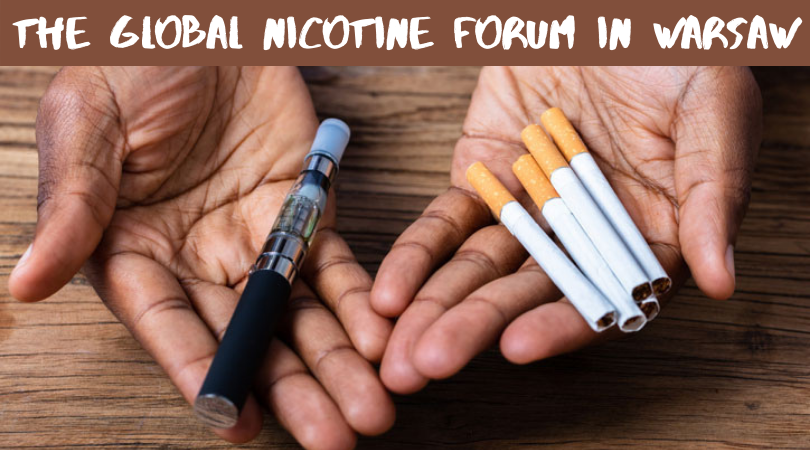The Global Nicotine Forum in Warsaw
 The Global Nicotine Forum has been held in Warsaw annually since 2014. It is the only international event of its kind to focus on nicotine products that are less hazardous than cigarettes. Innovative technologies, new medical research, legislative regulation – all these topics were the focus of the forum participants. The Forum brings together people who support the strategy of reducing tobacco harm by completely replacing smoking with less harmful ways of consuming nicotine.
The Global Nicotine Forum has been held in Warsaw annually since 2014. It is the only international event of its kind to focus on nicotine products that are less hazardous than cigarettes. Innovative technologies, new medical research, legislative regulation – all these topics were the focus of the forum participants. The Forum brings together people who support the strategy of reducing tobacco harm by completely replacing smoking with less harmful ways of consuming nicotine.
Global forum. The badges of the forum participants could be used to study geography. Antarctica was not represented, but all other continents were. 70 countries, about 600 delegates such as BusinessMirror, Sky Pharmacy, The New England Journal of Medicine, etc. Oral and poster presentations, press conferences, a film festival – there were so many events that it was physically impossible to visit all of them at once. The Second International Symposium on Nicotine Technologies was also held in parallel with the Forum.
Forum topics. The variety of topics in the talks was simply striking: “The Role of Next-Generation Electronic Cigarettes as a Replacement for Schizophrenic Spectrum Smokers”; “Perceptions of tobacco harm reduction strategies by smokers and non-smokers in Nigeria”; Potential Cosmetic and Social Benefits for Consumers of Electronic Cigarettes and Tobacco Heating Systems; Impact of switching from smoking to alternative non-flammable tobacco products on dental health; Bullying and Scientific Evidence: What You May Not Know About American Smokeless Tobacco; “Using Nicotine to Help Smokers Quit Smoking.”
Nicotine problem. The theme of the 2019 forum is “It’s time to talk about nicotine.” Nicotine is a key word in solving a global problem – fighting the tobacco epidemic. The main points of the harm reduction strategy from tobacco use are as follows. Nicotine is not equal to smoking. The main harm to health is associated with the process of burning tobacco and getting tar and other harmful substances into the smoker’s lungs of every seventh inhabitant of the planet smokes. It is unrealistic to get over a billion people to quit smoking immediately. Even those who themselves want to give up a bad habit often do not find the strength to part with nicotine. Convincing cigarette smokers to switch to less hazardous tobacco use without burning can save the lives and health of millions.
And then a problem arises, which has been discussed during the sixth forum in a row. The World Health Organization and regulators in many countries, who often fail to distinguish between cigarettes and alternative ways of using tobacco, also need to be convinced of the value and benefits of this strategy. Besides, in some countries, vaping is even prohibited without banning cigarettes.
The harm reduction strategy has already proved itself well in other areas – in the fight against the HIV/AIDS epidemic and heroin addiction. There are examples of how new technologies have saved health and lives in a variety of areas. Thanks to airbags, seat belts, head restraints, child car seats, cars have become safer. The massive proliferation of refrigerators has led to a sharp decline in food poisoning and gastrointestinal diseases.
But often the arguments of those who advocate harm reduction in the fight against the epidemic of tobacco smoking, the authorities and the public in many countries do not want to listen to it and take it into account.
The approach to electronic cigarettes
The authorities around the world take different approaches in relation to e-cigarettes and tobacco heating systems. In Thailand, for example, they are completely banned under the threat of a heavy fine and imprisonment. In Brazil and Colombia, they cannot be sold, but they can be used. In South Korea, there are practically no legal restrictions (except for the prohibition on selling to persons under 19 years old), even advertising of such products is allowed.
It is interesting to note that countries where e-cigarettes and tobacco heating systems are widespread are simultaneously seeing a steady decline in the number of smokers.
International nicotine forums are one way to persuade legislators and regulators to take into account smokers’ interests and scientific evidence regarding e-cigarettes and tobacco heating systems.
For example, New Zealand, the United Kingdom, the United States, Italy, Bulgaria, and Portugal have made legislative changes to take into account scientific evidence and, in some cases, verify it. So, the progress in this direction is noticeable.
We currently have no dialogue with the World Health Organization (WHO). WHO is still firmly committed to the ideological opposition to the tobacco industry. We believe this approach is wrong and hope that it will change. The focus should not be on industry hatred, but on new, low-risk products and how they can affect the lives of smokers. 1.1 billion smokers worldwide are eligible to get it.
